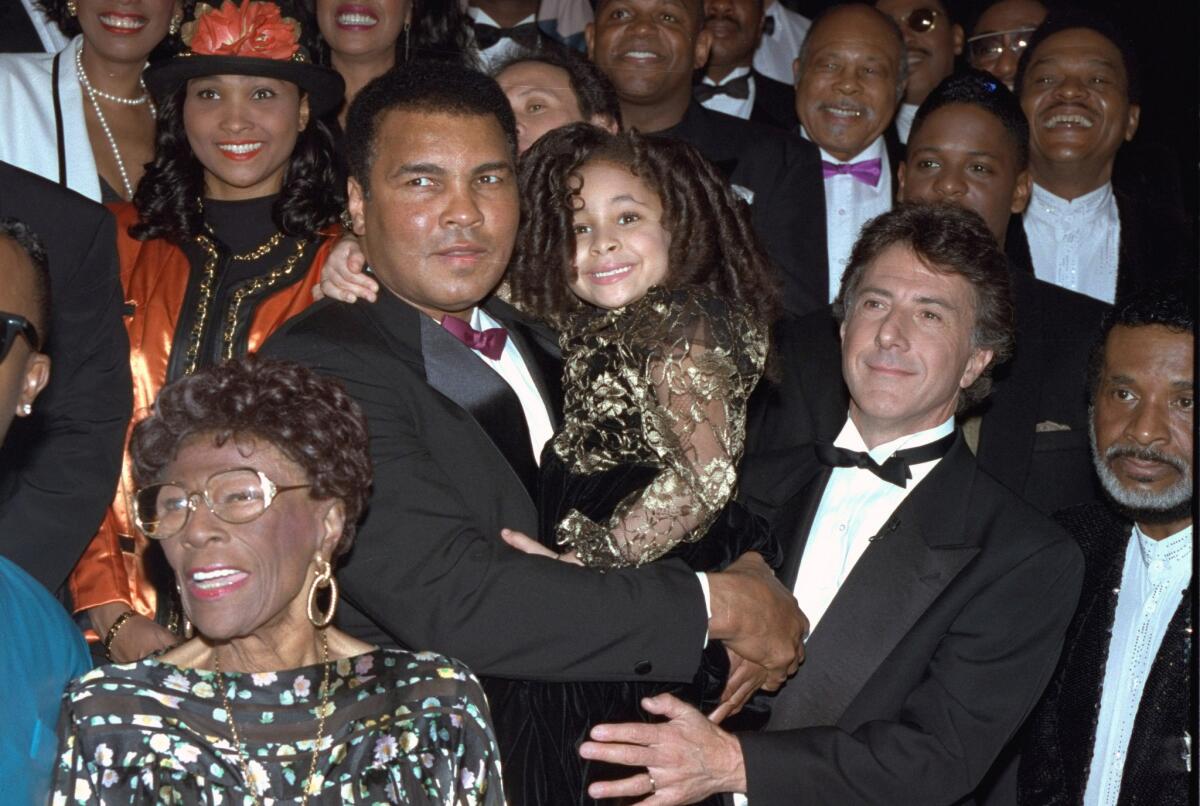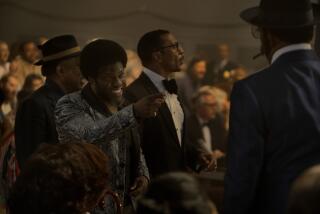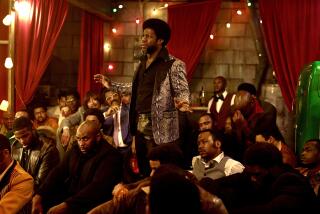From the archives:: Muhammad Ali: Still nifty at 50

Boxing legend Muhammad Ali, shown holding young actress Raven-Symone, center, poses for a group photograph prior to a celebration of his 50th birthday in Los Angeles.
Today is Muhammad Aliâs 50th birthday.
Like everyone else, I canât help but consider how the young Aliâs seemingly endless energy had promised us that he would never get old. I recall that now-distant time when his hands and feet seemed to be moving constantly in almost impossibly splendiferous patterns, when his eyes shone like June blackberries, when there was music in his voice and it seemed to roil up in great hopeful waves from deep in his abdomen.
And how in many ways he is now older than just about anyone his age.
Yet I donât feel bad for Ali. One of the first things you notice when spending real time with him these days is how quickly you forget about his malady. Aliâs life is still larger and more interesting than most of the rest of us. He seems less than fulfilled only when we see him in the smallest of ways, when we donât recognize that his affliction and its aura of silence enlarges both his legend and his life.
Muhammad Ali is content to be the person he is, is relieved not to have to be the old noisy Ali. He no longer aches with the ambition, the violence of a young god.
Ali sometimes speaks in a stuttering voice that is scarcely louder than a whisper and which issues from high in his throat. For him, the effect must be much like trying to write a story on a typewriter with a worn ink ribbon and a few keys that often stick.
While sitting, he occasionally drifts in and out of sleep. Iâve been told that when he goes to bed for the night, he has some trouble sleeping until morning. These sleep disorders do not mean that he is listless. He has an amazingly high energy level: he travels the country for many days in a row, making appearances and being on the move for up to 16 hours a day. There are slight tremors in his hands â particularly the left â and his head shakes almost imperceptibly when he is tired.
He is strong, his skin still glows and, when he works out and keeps his weight down, he looks 35 years old. When he isnât training and his weight is high, his energy drops. Despite the swirl of rumors suggesting otherwise, he is not in any way âpunch-drunk.â
Indeed, just the opposite has happened â Aliâs illness has matured him and made him a serious man. The silence around the new Ali can make him seem like a seer. He regularly sits on the edge of conversations, listening. He doesnât often talk, but when he does, he chooses his words with surgical precision. If youâre patient and wait on him to speak, youâre almost always rewarded.
When asked why, unlike the old days, everyone, everywhere seems to love him, he spreads the fingers of his shaking left hand and says, âItâs because of this. Iâm more human now. People arenât scared of me no more. They believe Iâm like them and thatâs good.
âItâs the God in people that connects them to me,â he says.
âHe coped with everything from Sonny Liston to the war in Vietnam,â Hunter S. Thompson has written of Ali, âfrom the hostility of old/white draft boards to the genuine menace of Joe Frazier . . . and he has beaten every person or thing ever put in his way.â
Ali, of course, didnât whip every obstacle in his life. Only enough of them that we remember him as having done so.
It has been more than three decades since Ali first exploded onto our TV sets and into our lives. Over the years and on his own terms, he became what he said he would become â âthe greatest of all times.â
Olympic light-heavyweight gold medalist, the only man to win the heavyweight championship of the world three times, he is one of the most important people in the 20th Century and the most influential athlete ever. He is no intellectual, but he has enchanted and fascinated intellectuals and poets and philosophers.
Writers, not just sportswriters, have written about Ali â Thompson and Norman Mailer and Joyce Carol Oates and Wilfrid Sheed and James Baldwin and Budd Schulberg. Marianne Moore even wrote a poem with him. British filmmaker Lindsey Clennel, who is producing a nine-hour documentary on Aliâs life, says more film footage has been shot of him than of anyone else in history.
We admire Ali not only for the obvious reasons â the singular grace and beauty with which he fought for almost 25 years, his boastful prettiness, his huge charm and presence, his contagious and unique humor, his brave stand against the Vietnam War (and all war) â but also for the great dignity with which he has carried himself through his afflicted middle years.
Aliâs health: How is it? This is almost always the first question people ask about him.
Thereâs an article in a recent issue of Esquire that claims that by March, 1991, Muhammad Aliâs Parkinsonâs syndrome had become so pronounced that he was unable to travel. What was intimated in the piece was that pretty soon old Mr. Thanatos would come knocking for the Champ. When a major national magazine prints this sort of rumor, they should do a better job of research.
During the spring and summer of 1991, in addition to a trip to Las Vegas, Ali flew to Philadelphia and to New York (three times); from New York, he drove to his old training camp outside of Deer Lake, Pa., and to Atlantic City, N.J., and Washington. He also went to Los Angeles (four times) and to Atlanta and Miami; to London and to Saudi Arabia and the United Arab Emirates, and to Japan.
And of course, he made several visits to Louisville to see his mother, Mrs. Odessa Clay, and his brother, Rahaman.
Ali is in Miami International Airport. As usual, people are looking at him with the same sweet sadness they would ordinarily reserve for a favorite uncle who has recently suffered a stroke.
Heâs wearing a black short-sleeve shirt, a pair of black dress slacks. Heâs carrying probably about a hundred Muslim handouts â yellow, green and blue pamphlets, all of which have been personally signed and predated with todayâs date. His hair needs combing and his face is swollen. He looks exhausted after a trip to visit his old trainer, Angelo Dundee, whom he seldom gets to see.
Entering an airport coffee shop, he spots a woman with her head folded into her arms, slumped across a table. He takes a seat beside her and asks whatâs wrong.
She looks up and doesnât seem to recognize Ali, but tells him her purse has been stolen. The woman, wearing a pink warm-up suit, is short and heavier than she needs to be. She has graying black hair and deep-set green eyes that bulge as if someone has grabbed her around the neck and has squeezed, not real hard, but steadily, for many, many years.
She laughs a weary laugh and says: âIt had all my money in it. I donât know how Iâm going to get home. And how can I tell my husband? He doesnât like me spending so much, anyway. Sometimes we have some real blowouts over money.â
Ali puts his pamphlets on the table and pulls a tattered brown cowhide wallet from his pants pocket. It has $300 cash in it and an old picture of him with eight of his kids. Although he is no longer world-class wealthy, he gives the woman $280.
Aliâs generosity has allowed him to be taken for millions of dollars over the years, often by those he has called his friends.
One of the more recent users helped arrange Aliâs 1990 visit to wartime Baghdad. Unknown to Ali, who saw his mission to Iraq as being one for peace, this fellow tried to make a few dollars for himself by transporting a boxing ring to an area near Saudi Arabiaâs border with Kuwait so that he could coerce Ali into fighting a 10-round exhibition. Fortunately, he was unsuccessful in his effort and is no longer associated with Ali.
Does Ali know that he has often been taken advantage of? Yes. Does he mind?
âI want to do as much as I can for everybody I can,â he says.
People are concerned about Aliâs ability to support himself in his later years. They neednât worry. Financially, heâs comfortable.
In addition to his 200-acre farm in Berrien Springs, Mich., Ali owns his Deer Lake training camp and much of the mountain on which it was built â the camp is now being used as a home for abused children â as well as sizable tracts of land in Virginia. He has several vehicles, including a Rolls-Royce, a Winnebago motorhome, and a four-wheel drive Jeep that his fourth wife, Lonnie, often drives.
Lonnie Ali grew up in Louisville across the street from the Cassius Clay Sr. residence. Her mother, Marguerite Williams, is Mrs. Clayâs best friend. Like Aliâs mother, Lonnie is light-skinned, splashed with a galaxy of freckles; her hair has an aura of redness to it, and she is roundish but not fat. Lonnie is tall and strong. She is a gentle person, yet not naive. She and Ali were married in Louisville in 1985, after she earned her MBA. She is carefully spoken and her reputation in her husbandâs business affairs is one of shrewdness tempered by a relaxed, understanding nature. Like her husband, she has a dead-on, yet non-judgmental, way of looking at people.
Lonnie Ali explains how she reacts when people try to treat Ali as a cripple.
âPeople believe what they read in the press,â she says. âI just wish some writer could tell the truth about Muhammad, could find a way to get to his soul.â
Ali and his wife contacted Thomas Hauser to write âMuhammad Ali: His Life and Times,â which was published last summer. Ali shared in the cash advance for the book, which made the best-seller lists and is scheduled for overseas editions, and he receives a percentage of every copy sold.
Ali is paid to do several autograph-signing sessions a year and to make appearances at major fights. Privately, he says he no longer cares about boxing and that if he werenât paid to do so, he would seldom go. He has trust funds that comfortably support him and Lonnie and his family, including a new child, Ahad Amin Ali, whose name roughly translates as, âson of the lion.â
Children, anybodyâs children, remain one of Aliâs great pleasures. Whenever kids are near, he goes out of his way to pick them up and hug and kiss them, sometimes more tenderly than one might imagine their own parents doing. One of the first questions he often asks visitors is if they have kids.
When asked why he connects so easily with children, he says, âTheyâre angels in exile,â answering in the same tone you would expect from a monk exposing the uninitiated to the mysteries of life. âChildren are so close to God. They havenât had time to separate from Him.â
When Ali is at home, he spends many hours signing Muslim handouts and photos of himself, replying to fan mail, reading the Koran and praying.
Thereâs also time for his new son, whom he sometimes calls Triple A. His other eight children are from previous marriages; they do not live with Ali. The oldest, Maryum, is a professional comedienne and singer who looks markedly like Janet Jackson. Several of the Ali offspring are in college.
Ali doesnât often see those people who were with him during his ring career. The notable exception is his personal photographer and best friend, Howard Bingham. The Ali children refer to Bingham as âUncle Howard.â He is the only person they call âuncleâ other than Aliâs brother, Rahaman.
There are periods when Ali trains regularly, walking several miles every day around the farm and on country roads, and boxing five to 10 three-minute rounds on a heavy bag and a speed bag.
When Ali travels, as he does often, he sees his mission as being Godâs: He considers himself to be an emissary for Allah. Ali chose to buy his farm in Berrien Springs partly because it takes less than two hours to drive from there to the Muslim communities of Chicago. Since the death of founder Elijah Muhammad in 1975, the Nation of Islam has become a fairly moderate sect.
Hauser, an agnostic, says: âBeing in Muhammadâs presence while writing the book has increased my faith and made me a more giving person.â Almost all Ali intimates will tell you the same thing.
There is no way to overstate Aliâs popularity. On recent trips to Saudi Arabia and to Jakarta, Indonesia, hundreds of thousands of people turned out to greet him.
Ali becomes rankled by those among the Islamic community who do not strive for wisdom and for peace.
âIslam means submitting to the will of God,â he explains. âIt donât have nothinâ to do with makinâ war. It means being at peace with God.
âIâve traveled the whole world. I learn something from people everywhere. Thereâs truth in Hinduism, Christianity, Islam, all religions. And in just plain talkinâ. What Iâve found is that the religion that matters, the real religion, is love.â
These are the words with which Ali closed an informal debate last summer between himself and a group of Christian students at Kentucky State University.
There were about 20 interested people around him as he sat in a lobby outside the student book store and talked for several hours. He often had to repeat himself to be understood, but he didnât seem to mind.
Iâve seen Muhammad Ali box twice in the last five years and have been surprised on both occasions by how well he still moves.
One time was at a gym in Louisville, against a local heavyweight who was politely trashed by Ali for two rounds.
The second time provided one of the most quietly powerful memories of my adult life.
Not long ago, there was a tribute for Ali at a community center in Berrien Springs. This farming community has 5,000 residents; there were nearly that many people in attendance. At the end of the program, he brought around 10 kids from a local amateur boxing club. Standing in his driveway at dusk, he pulled his shirt-tail from his trousers and slipped on a pair of 16-ounce Everlast gloves.
Then, under the streetlight beside his garage, Ali gave every boy a couple of rounds with him. He dropped his hands to his sides, stuck out his chin, let them bang him to the belly. His white shirt accentuated his upper-body movements. He appeared to glow in the near-dark. He fought at all times just a little above each boyâs capabilities. On the couple of occasions when one of them tried to get to him, tried to make it a real fight, Ali would show them that he was still Ali. He would spring three to four crisp jabs at the boy, or thump him with a leg-shivering straight right, but he was always careful not to hurt anyone.
After a couple of hours, I became sleepy. I got in my car to leave, but then just couldnât. I sat leaning over the steering wheel, where I watched the Champ and his students move around the sparkling asphalt until well past midnight.
Note: This article was originally published on Jan. 17, 1992.
Davis Miller is boxing editor of Sport magazine and a friend of Muhammad Ali. One of his stories about the former heavyweight champion, âMy Dinner with Ali,â was commissioned by the Louisville Courier-Journal Magazine and was judged by the Sunday Magazine Editors Assn. as the best essay published in a U.S. newspaper magazine in 1989.
More to Read
Go beyond the scoreboard
Get the latest on L.A.'s teams in the daily Sports Report newsletter.
You may occasionally receive promotional content from the Los Angeles Times.










